Reiner R (director) (1986) Stand by Me [motion picture], Columbia Pictures, accessed 1 September 2024. https://www.clickview.net/share/G0WVBL?a=true&t=3214
CAMELS – Gordie
A dream is edited into the film, depicting Gordie’s father saying that instead of Denny dying, ‘it should have been you, Gordon’. He even uses Gordie’s formal name, to show that he is unapproving of Gordie’s aspirations to be a writer.
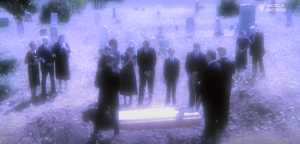
One of the key moments that defines Gordie’s change in attitude and strengthening in character is when he finally opens up about the sheer grief he was feeling over Denny’s death. After the dream, the high camera angle portrays Gordie as vulnerable and scared, compounded by feeling unloved by his parents. However, after this moment he accepts that he must stand up for himself, and his attitude changes from that moment on.
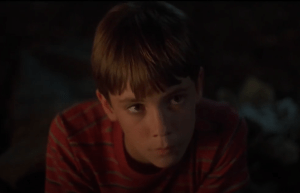
Connections – Gordie
In my own life, there are always others who pressure me to do certain things and act certain ways. For example, choosing subjects for VCE, or what extracurricular activities to do. Like Gordie, these external opinions have some influence on the decisions I make, but as Gordie learns by the end of the film, you don’t have to always listen to them. This is why, like Gordie listens to Chris, who genuinely supports him with his dreams, I try to listen to those who genuinely support me.
Gordie
At the time of the journey, Gordie is still struggling with personal and family problems; the loss of his older brother Denny, and him being the ‘invisible child’, barely acknowledged by his parents. Many characters, including Gordie father and the shopkeeper near the junkyard, expect Gordie to be just like Denny.
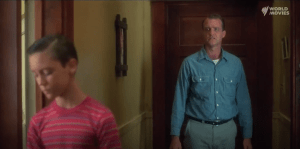
However, the only person who accepted Gordie for who he is, an aspiring writer, is no longer with him. These expectations heavily affect Gordie, leading to him even saying that writing is ‘a stupid waste of time.’
I don't want to be a writer
Throughout the film, we see a change in Gordie. He goes from a complacent boy who lets others tell him what to do, to someone who stands up for himself in front of dangerous enemies. His courage in standing up for himself in front of Ace is symbolic of him standing up for his own life choices, and not letting his dad’s expectations define him.

In the end, it was the grief, and not feeling good enough, that finally led to Gordie firmly decided not to be complacent, walk his own path, and choose what he wants to do. This is proven when, at the end of the film, Gordie as a dad is a writer.
CAMELS – Chris
While Chris is telling the story of the milk money, there is no non-diegetic sound. This conveys the solemness of the conversation, and the feelings of hopelessness that Chris is feeling about his life, how he will turn out to be a nobody, further shown through his angry yet sad acting.
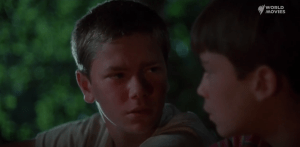
Connections – Chris
Text to World: Around the world, there are many examples of individuals who break the cycle of poverty, unemployment, etc. A famous example is J. K. Rowling, who lived in poverty, and relied on government support until her famous Harry Potter series became popular. One would doubt that much good would have been expected from her, similar to the reputation associated with Chris. Yet both of these people became successful individuals, showing that, while hard, it is not impossible to be something better.
Chris
Out of the 4 boys, Chris’ reputation would have to be the worst, with a sketchy family history, and seemingly always up to trouble. With an alcoholic dad, and a gang-involved older brother Eyeball, no one expects much of him.

Not even Chris believes in himself. He believes he’s just ‘one of those low-life Chambers’ kids.’ Nevertheless, through the encouragement and friendship of Gordie, he breaks the cycle, takes college courses, and becomes an attorney, fuelled all along by his desperation to ‘get out of this town’. Reiner conveys the message that, while it might be difficult, you can always break free of the stereotypes and reputation you might have, and become something better.
CAMELS – Teddy
Mise en scene is used when Teddy throws his sleeping bag over the junkyard fence like a grenade, imitating his father out of admiration for him.

Acting plays a big part in Teddy’s night watch scene, where even his seemingly mindless monologue provides evidence that Teddy tries to approach challenges and scary situations like his father would have.
Teddy's Watch
This carefree and reckless attitude that Teddy has, while showing admiration, can be dangerous as well, such as when Teddy tries to train dodge. The quick cuts between camera shots add tension, questioning whether Teddy is a ‘loony’ for acting like his father.
Teddy's Train Dodge
Connections – Teddy
Text to Self: In my life, I often try to act like sports players I admire, such as trying to play tennis like Federer or Djokovic, mimicking their mindsets and strategies. I do this because I look up to them, relatable to how Teddy looks up to his father, and tries to act like him because of this. This attitude also helps to overcome challenges I might face, because, just as Teddy might ask ‘what would my dad do?’, I ask myself ‘how would this tennis player beat my opponent?’

Text to Text: In the book series Artemis Fowl, the protagonist finds himself making a tough decision, whether to continue his criminal life, or to ‘stay on the straight and narrow’. As we find out later, he chooses the latter, but only because of the strong influence from his parents. This relates to Teddy’s life, as while he could approach challenges and live his life however he wants, he chose, especially along the journey, to follow the strong influence from his father.
Teddy
Teddy DuChamp has a tough family background, filled with anger from his father as he struggles mentally after returning from WWII. This is most evidently shown through Teddy’s ear, which is half-burnt after his father held it to a stove.
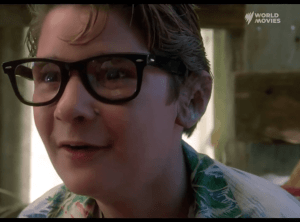
However, it can be inferred that a large part of Teddy’s life and background is pride for his father, and what he did in the war. This makes him approach challenges like a war situation, similarly to how his dad must have approached daily life in WWII. Some examples are:
-
- Night watch

-
- Trespassing into the junkyard
- Leaving the safety of the train tracks
Of all these situations, a key element is fear, and Teddy seems to overcome this fear, or challenge, through his admiration of his father and wanting to make him proud. This is also why he is offended so deeply when Milo Pressman calls his father a loony, because Teddy sees past that and into his father’s heroism.
